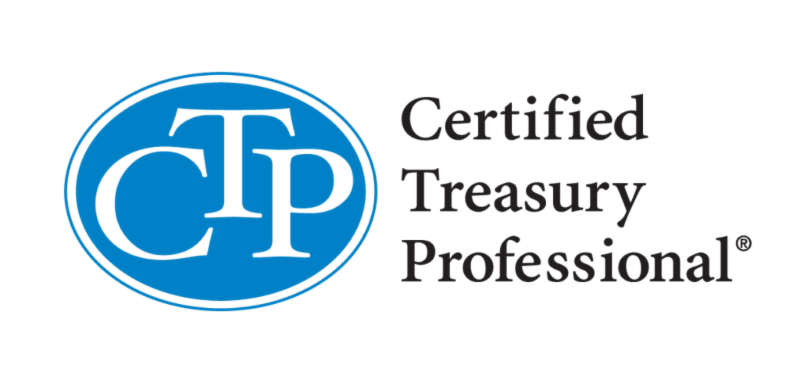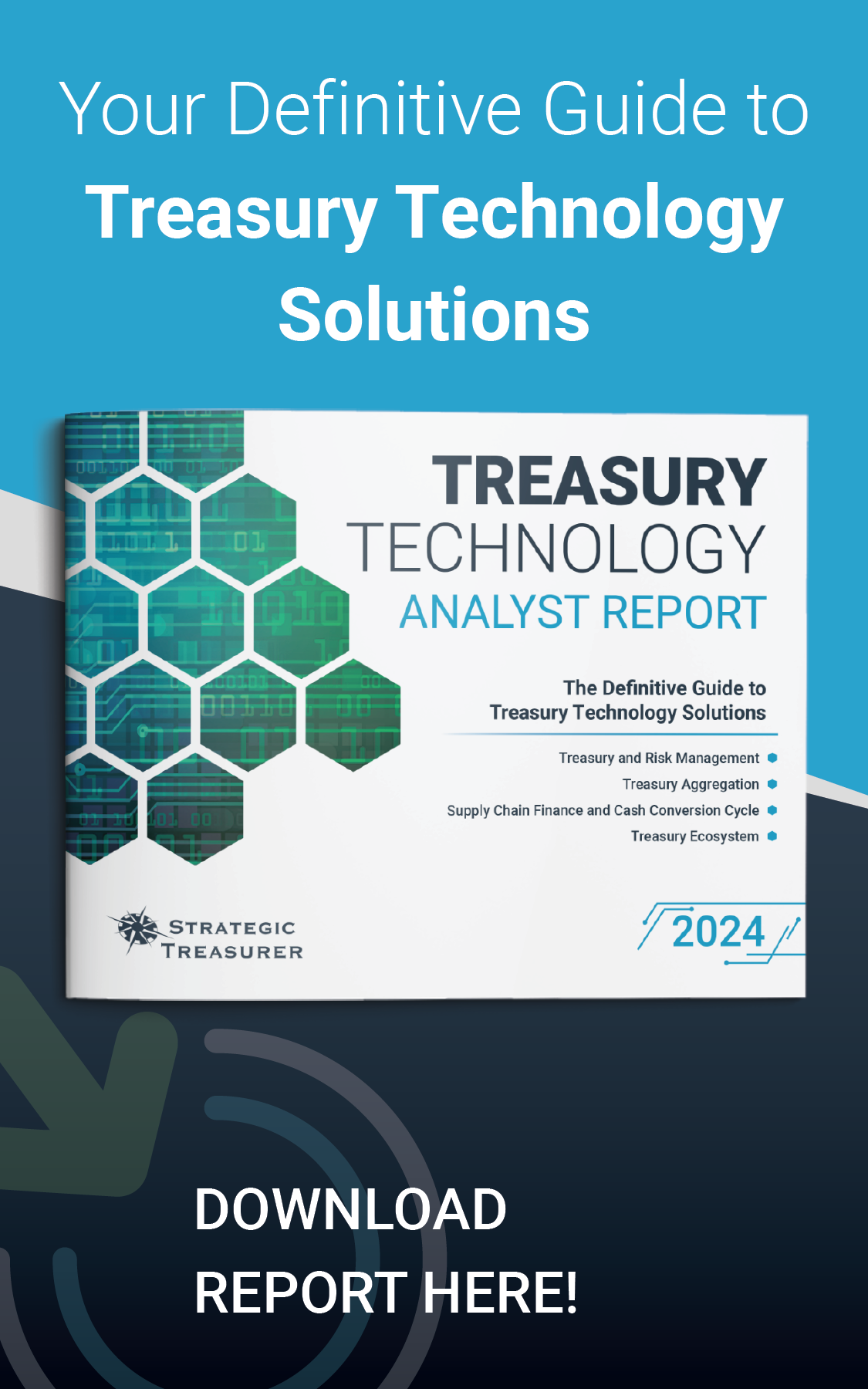
Episode 246
Becoming a Treasurer Series, Part 25:
Languages of Finance: Controllers
In the Language of Finance sub-series of the Becoming a Treasurer series, we will look into different terms that should be understood in order to communicate effectively with the rest of your treasury team and with others. In this episode, Craig Jeffery and Jason Campbell discuss some important questions regarding controllers. How does the language of a controller differ from the language of treasury? When do controllers, accounting groups, and treasury need to work together? Listen in to find out.
Host:
Jason Campbell, Strategic Treasurer


Speaker:
Craig Jeffery, Strategic Treasurer


Subscribe to the Treasury Update Podcast on your favorite app!
Episode Transcription - Episode #246 - Becoming a Treasurer Series, Part 25: Languages of Finance: Controllers
Announcer 00:04
Welcome to the Treasury Update Podcast presented by Strategic Treasurer, your source for interesting treasury news, analysis, and insights in your car, at the gym, or wherever you decide to tune in.
Jason Campbell 00:18
Welcome back to another episode of Treasury Update Podcast. I’ll be your host Jason Campbell, development leader here at Strategic Treasurer on this series here, we’re gonna continue forward talking about what it’s like to become a treasurer. So really excited. We had a great first episode talking about FP&A. And looking forward to this one talking about controllers in this Language of Finance series. Joining me today is our Managing Partner, Craig Jeffery at Strategic Treasurer. Craig, thank you so much for joining today.
Craig Jeffery 00:47
Jason, it is good to be here. I don’t know that I had a choice. I think you made me come here to do this. But no, it’s it’s it’s a good topic. I do like this series on becoming a treasure. And it’s amazing how many good comments we get from people, people that are treasures, but also people that are trying to become treasures or are on the pathway to become treasures. What are the skills that people need? How can they develop, some people have certain items well covered, others are looking to develop. And this idea of communicating effectively, throughout the organization is really foundational to being a treasurer, you can be deep technically, within treasury, but you might be capped at director level or at level if you’re not communicating well across the board. And so good communication is foundation to treasury. And so this is a great area to focus on.
Jason Campbell 01:35
On I love the fact that we’re doing this series, I think like you said, it’s educating folks who are either dabbling or not fully understanding the you know, how Treasury or finance and these departments work and even for myself prior to coming and joining your team, just understanding the different layers, and there’s a lot of complexity that comes into it. But knowing what that avenue is from a career path, where’s that progression look like in the world of finance, you know, outside of just assistant treasurer or a treasurer or accountants or CEO CFOs things of that nature, the C suites, but understanding there’s different layers that fall within that finance and Treasury world. And it’s great that we’re having this series to educate our audience. And so when it kicked off, I know that the first episode, we talked a lot about that financial planning and analysis role. It really kind of turning gears just a little bit as we talked about the universe in our last one. And we talked about every function has a different world as part of this galaxy. So let’s go and talk about this controller world. What is the purpose of the languages of finest sub series?
Craig Jeffery 02:35
The reason we have this particular sub series, I said a little bit on the intro, but the reason we have this is to help people communicate well, and effective communication is vital for the organization, particularly at the top of the house, and anybody who’s a treasurer looking to become a treasurer needs to communicate very well. The other the other reason why this is so important is if we, if we don’t understand the language that other people use, we don’t understand what they’re doing. And there’s two ditches, we want to avoid two ditches, one on each side of the road. One is we don’t understand another area, we don’t understand the language, we don’t care. And therefore, we think it’s so simple, it doesn’t need to be understood, well, it’s a we’re off in a ditch over there, because we haven’t taken the time to know the other ditches. We think it’s you know, mystical beyond understanding. And so it’s something that can’t be decrypted either of those, both of those are not not great, great options, because we need to know how to communicate, even if we don’t have, you know, we can only go two or three levels deep on an area, we still should understand how others are understanding their role in the organization because we can’t communicate effectively, it doesn’t take that much effort to know an area two or three levels down. Now getting down four or five levels, you may never get there. But But understanding the other areas, right, that’s how we can drive down, let’s say the middle of the road or without falling off into either ditch. I think that’s one, one key component, this idea of communicating effectively. There’s a couple of hours, you probably know the the general phrase like people don’t care how much you know, until they know how much you care. Right? And that’s kind of like this general thing. Like, are you concerned? Are you just asking questions? I think we all know that right? That’s a great poster to stick on a wall right to to feel good. But there’s an element of people won’t communicate well with you, if you don’t take the time to know what their, what their businesses are, what they’re they’re doing, because you don’t understand what they’re saying. And you don’t make the effort to understand what they’re saying. So understanding the language means I have to get a rudimentary knowledge I have to get like a travelers version of the controller language or travelers version of FP&A or travelers version of treasury so I can I can find my way around like where is Where’s the restroom? where’s the where’s the water closet? Where is working to get food or how much is it? Is there a taxi stand here? Whatever. There’s quite Questions are and the phrases you need to know, to travel globally, you need to know that to travel in your business. So it’s good communication requires understanding other others terms and their key drivers.
Jason Campbell 05:14
You brought up some good points, it’s always good to go back and revisit, we talked about effective communication. And it’s one of those topics that as it refreshes in your mind, it kind of also helps you kind of look inside and says, you know, you know, in order to be, you know, a great communicator, right, you have to be a great listener. Sometimes it’s just come on, you know, sometimes folks just want to talk and get their point out well seeking to understand or listening for others and to ensure alignment or fill in the gaps. And they say it’s investing into somebody else, just like have a normal conversation, right. And effective communication is also important to have a strong bridge and a strong relationship with folks around you. Because as you said, that shows that you care, you’re invested into it. And I think it’s always great to bring that back up, as you just mentioned, especially as we’re talking about languages of finance. So how is the language of comptroller different from treasury?
Craig Jeffery 06:01
My formal training was an accounting. And I just remember, you know, we always talked about accounting is the language of finance, it’s the language. And I guess, as I’ve continued in my career, I think I understand the language of finance is different. The language of finance is finance. It’s more treasury and finance oriented than it is the language of financial reporting. And the language of accounting, that’s the language of financial reporting, there’s a focus there on detection of any problems in the system, that the your your financial reporting process, will be able to identify, detect and capture information so that it can discover problems as they occur and correct them or there’s an adequate audit trail. So it is clearly the language of financial reporting. And then there’s the language of finance, which tends to be more, I’ll say, forward looking versus backward looking. And that sounds negative. But, but there’s a financial reporting is what has happened. There’s an aspect of controllership that has to look forward to, but that’s the general orientation of it, how are we accurately capturing the flow of the business so that we’re stating our assets properly, you know, we’re capturing income, the expenses that go into generating revenue are properly matched the matching principle. All of those are awesome principles of financial reporting and accounting. But those differ from some of the, you know, other principles and language that exist for Treasury and other parts of finance. Just understanding that is really vital. Now everybody will think that whatever they’re doing is the proper best language. But the reality is, there’s different languages, and we need to understand how they’re used and where they’re used. And so some of those terms and concepts, and we’ve done some podcasts, it might be a really long time ago, where we talked about some of these differences. And I’ll use some of the terms there’s cash is a term that that’s actually quite different. It’s used differently, there’s different standards that are used generally accepted accounting principles versus, which is a discipline and financial reporting, versus standards of good corporate conduct or commercially reasonable procedures, things that treasury’s, treasury groups tend to use. Working capital is another term that is very different from what bankers and accountants will use versus someone working on the efficiency of the cash conversion cycle. So very, very different terms there. We can also look at the emphasis on controls, preventative controls, stopping something from happen is massively important in Treasury because they’re, they’re moving huge sums of funds on a daily, almost immediate basis. And so they’re, they’re all about protecting things from bad things from occurring, because of the magnitude of those types of transactions. Where’s the orientation? There’s a big orientation on detective controls in controllership responsibility because usually we’re doing high volume, low value there’s an aspect both focus on both but just the the urgency for preventative controls is very very top of mind, on top of finger for treasury, treasury movements.
Jason Campbell 09:16
Because I think of controller I think of that voice like the head you know, like we in movies know sci fi movies that say you cannot go past this point without something, you know, the treasurer talking about, you know, that control that detecting and preventing that sort of thinking like gatekeeper you know, from the you know, the oz you know, as The Wizard of Oz or whatever that voice in my head when you were talking about this, just what popped up not that it’s related to it, they deal with Treasury. This is what was so it was coming through so isn’t that isn’t that Lord of the Rings You shall not pass it could be Lord of the Rings, you know, it could be it might be I don’t know.
Craig Jeffery 09:51
Well and there’s and there’s a bunch of you know, you shall not pass so it’s like you know, everyone’s familiar with double entry accounting, or we sometimes refer to triangulate account, but this idea that these things have to be holds every transaction have to balance have to flow through there certain things when you recognize revenue or, you know, there’s there’s a number of great rules that help us have accurate financial statement. So we don’t have accurate financial statements, where does an investment go? And in a society of capitalism, right, you have to have fair financial statements, if you don’t have that, you break capitalism, because no one’s going to invest in these areas, if it’s not fair. And so these are all that’s vital for the ongoing vibrancy of, you know, capital organizations, you know, where, where people put their put their funds, so you shall not do certain things. Yeah, there’s, you shall not recognize revenue too early. There’s reasons for that there’s good reasons for that different, you know, you shall not lose money, you shall not leave your cash on protected. Those are some of the key principles. On the Treasury side, there’s, there’s a lot of really good principles and standards in both areas. And I will say that, from the accounting side, those principles and standards have been more well defined and formulated, it’s a larger discipline, there’s a lot more people in accounting, than there are in Treasury, for example. And so they point to oh, generally accepted accounting principles, different rules and standards that they have, and that they’re just generally accepted. It’s almost a shortcut. You’re like, oh, we have to do this. Why? Well, that’s reasonable. That’s we couldn’t do it any other way. That’s like, it’s almost like bizarre that you would say anything different. And a treasury, sometimes there’s a lack of a body of of standards that everyone points to and defends them say, hey, if we have this, these five things have to take place. It’s unreasonable. It’s not a commercially reasonable standards. It’s not a standard good corporate conduct, if we’re not doing these things.
Jason Campbell 11:45
Yeah. And you know, it’s funny, you’re talking about accounting, and I remember going to school and taking accounting and gap, everything was gap, gap, gap, gap gap. So but as again, you said that that’s that’s, that was the scope that was that was the sandbox you played in, especially as an accounting, like you mentioned, you know, having accurate financial statements and making sure that everything is is presented to your shareholders and your investors, whoever, like, you’ve got to make sure all that’s accurate and safeguarded. So until we can see where that again, detective and preventative comes into play. So what are the problems with misunderstanding each other between the controller and Treasury.
Craig Jeffery 12:20
And we think about how we design processes, how we set up our banking structure, all of those out there, let’s say there’s mis misunderstanding between the two groups. And if I’m, if I’m the treasurer, and I want to design my banking structure, I’m like, let’s set it up this way, is the best use of cash the best cash management principles, and collect my funds very quickly, rapidly, I can see the distinction between collection disbursements, I can spot fraud, and I set things up. Maybe this is perfect from a treasury standpoint, but maybe I’m pushing together four receivable platforms into one bank account. So for different systems that are keeping track of it. That’s great. I have less bank accounts, it’s simple for Treasury. But now I may have broken for different receivable systems, because now four different companies are having all their deposits sent them to the same account. Whose is this? Okay, that’s yours. That’s mine. Now there’s this whole decision matrix that has to be put in place to resolve issue great for Treasury, but I broke a county, you can’t break accounting, if your treasury that’s that’s a, it’s not just a no, no, that means you’re not paying attention. You you need to optimize your treasury structure for good Treasury principles, but you can’t break account in the process. The other side is where accounting or the comptroller ship may have too much control or power. And they’re like, no, no, we need to do things this way. And we’ll decide how the banking structure needs to be set up. And it becomes extremely inefficient, because they’re saying, Here’s what needs to be done. Because I think I think about accounting first, that’s the first second and last item and I designed a certain way, now I’ve made it so I’ve broken or made my cash management, my banking structure, very inefficient. It says balance is like Treasury owns cash, Treasury needs to design the cache management structure and optimize it for the organization. That means taking into account accounting, it doesn’t mean it’s only about accounting, but it means taking those items into account. You can’t break the other areas. And so that would be that would be one example about of problems. The other area where there’s problems with misunderstanding has to do with the area of risk management. Now, this is kind of a lot for a foundational class and I haven’t thought through all the items but what I wanted to say not not a class of podcast, right? You think about things like the matching principle and accounting, what’s that you want to match your revenues with the expenses that were used to generate those right so you know, it’s matching like, Hey, here’s a period here’s what my income is. Net my expenses that were used to derive the doesn’t have plant or equipment and it’s the equipment’s good for 10 years, I don’t want to hit that all as an expense in one year. And then there’s no expense. It looks like I’m making great margin on the other one, I’m really, you know, I just I just bought capital as opposed to leasing it. But in terms of risk management, there is a difference in mindset for those that are treasury and risk management oriented, where they, they look at here’s the outcome can come across this range. It’s not a single point. It’s a range of what can happen, could be foreign currency movements, it could be interest rate fluctuations, whatever those areas are, they look at it as here’s a range of what can occur, or they should look at it that way. There’s a, there’s an element of maybe a bell shaped curve, maybe it’s wide, maybe it’s narrower, depending on the volatility. And you and I have talked about, you know, your roll two dice you can get from a two to a 12. The expected value mentality is what’s what’s the most common number, what’s the most likely what what will average over time is seven barrel to die, I’m going to get seven on average, well, that’s great. But you have to say, what can I getting it to to two to 12? What’s the likelihood I get seven? You know, the okay, there’s six combinations out of 36. Right? Right, that you can get seven, what about, you know, six to eight, right? I can do 16 Out of the 36 common, right. And so as you go out to the end is like, okay, there’s only one at the end, I have to get a one and a one to get a two out to get a six and a six to get a 12. And so that’s those two ends by themselves are 236 of of all the options that exists with the, you know, rolling a pair of dice. Risk management means I need to look and understand that those are the outcomes. And maybe I’m putting financial instruments in place, or I’m trying to manage what those risks are. So if I look at that curve, one side of the curve may say, I don’t want anything over the midpoint of the downslope of the curve, I want to get rid of all the tail issues on the right hand side, let’s say, for whatever the reason is. So I put a financial instrument in place, what am I trying to do? My purpose in doing that is to minimize the types of outcomes that I get, I’m comfortable up to that point, I can bear the risk up to there. But I think beyond that I don’t. And so I need to take that the other possible outcomes off the table, and I use a financial instrument. And so So you do that. And that’s that is the risk management mindset. I’ll call it the Treasury and risk management mindset. And that makes sense, right? I’m not being speculative. I’m trying to remove options, right? very undesirable outcomes. Now, another mindset can be I look at these as discrete events, and I go back and I look historically, maybe I’m a controller, maybe I’m, maybe it’s not even a control, maybe it’s a executive that looks and says, hey, those, that activity you did wasn’t needed, you put a financial instrument in place, you put a hedge in place, that was supposed to do whatever, but we never use that. And so all we did was lose money on that hedge. And we would have done better if we didn’t have the hedge. And so that’s a that’s an issue of, there’s a different mindset there. It’s like, okay, that’s great. Hindsight is 20/20, I can see, Oh, this looks perfect. Here’s what I would have done well, if you knew all those things would happen. You’re not a regular business, you’re, you know, you’re a hedge fund. And you’re you’re making bets on certain activities, but core Treasury is trying to reduce those. And so that’s one of the elements. Here’s like speaking the language of risk management, helping people sighs What are we trying to do? We’re trying to keep our, our risk in line with our risk appetite, what we’re willing to bear, from this point for this point over, we’re not willing to bear that. So we’re putting financial instrument in place. We’re extending the business, we’re doing something else. And so sometimes, and this this is, this is far more common with accountants than I would like to admit, as they’ll be like, Hey, we would have done better if we hadn’t have done that. That’s like saying, we would have embedded like, what have you been spent on life insurance, like we used it on better if you didn’t buy it? These last 12 years, I didn’t buy it, because I thought I was going to take advantage of it. I bought it because my loved ones depend on me for you know, X, Y, and Z. If I die, I’m not gonna have any income from that. And therefore, that’s not a good outcome. And so I’m paying for insurance to cover that. That type of discussion is really important for the overall organization. I’m not picking on the accountants, per se, but that can come up in the accounting world in the executive world. Now the the accounts that help with hedge accounting tend to understand those elements quite well. But other people are like, hey, what’s the expected value? It’s like, life is not an expected value. Right? I mean, it’s like it’s great to put a number in there but our forecasts can differ our the volatility of what goes on with currencies without comes with sales can vary quite a bit. So that’s that’s just another example.
Jason Campbell 20:02
Well, I think your point too, I think, you know, I think about risk management as a whole, you know, you’re trying to do your best way of assessing the condition of lives and trying to ensure that how to avoid it as much as possible, right? I mean, like you were talking about life insurance, you try to avoid death as much as possible, you know, I mean, I guess it’s object of life, right? It’s fine to give it as long as you can, you know, and you’re trying to empty again, you have to do risk management every single day. So I mean, I totally, totally understand that. So let’s kind of switch gears a little bit from the misunderstanding pieces to when do controllers and accounting groups need to work together?
Craig Jeffery 20:36
That’s a really good question, what can go wrong as one slide, but where they can work together? I would say when we think about the cash conversion cycle, right, there’s the buying materials, let’s say if you’re manufacturing, buying materials or going into products, you receive purchase orders. If you fulfill those, you ship those out to become receivables, receivables, you know, eventually get collected, you have to pay what you paid for your raw materials. So AP goes around, so cash enters in and comes out of the cycle. There’s a there’s an aspect of efficiency to that. That’s one aspect of workstreams not what I’m talking about here. But I do want to mention that those two groups need to work together and understanding there’s an efficiency side of that, and the capital side. And I’ll just say that, because I know these are supposed to be brief. But the other element is a workstream of anytime there’s a flow of funds, information and data, there’s usually an accounting aspect of it and the Treasury aspect of it. So I think about what do they need to work together, when you’re thinking about here’s a new flow, the entire workflow, workstream needs to be looked at Treasury could say, I don’t care about accounting or reconciliation. And I put in some new banking platform or new services, we’ll get them involved after the end of the month, when they care about doing the reconciliation, that’s a wrong way to go. Same thing. It’s like, okay, Accounting has to work this way, very difficult way to do and we don’t care about Treasury because we’re accounting, this idea of here’s a work, here’s a workflow. And I take an end to end view, I recognize there’s a way of how cash flows, the banking system, how it hits our different systems, how reconciliation needs to occur. So both parties need to understand that there’s a discipline, let’s say, for accounting or reconciliation, that timing matters, fractionalized payments matters, like, Oh, we’re doing card, we’re accepting card, well, it’s gonna be done on a net basis, as opposed to a gross, and then fees are taken out. Okay. So now I’ve got a net basis. And so the fees aren’t showing up in the banking system. And maybe the other fees are showing up in, you know, in the in the card card processing system, they still have to reconcile those. So you don’t want to design it in a way that’s going to be almost impossible to reconcile properly. And so when we think about a workstream, it’s saying, How can I look at this comprehensively, both sides of the equation, you know, it’s like, okay, treasury my, to me, it doesn’t matter and treasury, if I get the NAT or the gross amount, if I get a net amount, it’s I don’t have to worry about the fees, it’s less transactions. If I get a gross then there’s other fees, cash flow looks the same. But I may have broken what happened on the other side. And so when I think about workstreams, they work together, they can make sure that the accountant is designed properly, the flow through the bank accounts are designed properly. And that can lead to efficiency and control and efficiency and control matter to both of them. Control from a reporting accurate reporting standpoint. And control, the better things are controlled even from a reconciliation standpoint, the less likely that fraud will be able to happen and stay undetected. So both of those matter to the two parties quite well. So workstreams reconciliation, those are some of the big ones there.
Jason Campbell 23:51
Well, Craig, I appreciate, I think our listeners would definitely appreciate this episode, as well as we really kind of dived into that language of finance around controllers. So thank you so much for joining us today. We really do greatly appreciate your words of wisdom today.
Announcer 24:09
You’ve reached the end of another episode of the Treasury Update Podcast. Be sure to follow Strategic Treasurer on LinkedIn. Just search for Strategic Treasurer. This podcast is provided for informational purposes only, and statements made by Strategic Treasurer LLC on this podcast are not intended as legal, business, consulting, or tax advice. For more information, visit and bookmark StrategicTreasurer.com.
Related Resources
Earn your CTP credits on-demand
Check out our on-demand options for earning your continuing education credits for CTP. We offer 0.5 – 1.2 CTP credits for select webinars and podcast episodes. Listen and then take the coordinating quiz and pass it to receive your credits straight to your inbox!
Becoming a Treasurer – A Treasury Update Podcast Series
This series within The Treasury Update Podcast explores questions around being a successful treasurer. Topics discussed include preparation, what needs to be measured, effective communication, development of a team, and acquirement of resources needed.








